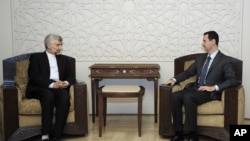WASHINGTON — Syria and Iran strengthened their relations on Tuesday after a top Iranian national security official visited Damascus to pledge Tehran's continued support against Syria's opposition.
Iran's national security council secretary, Saeed Jalili, visited with President Assad and praised Tehran's ally as part of an "Axis of Resistance" against foreign opponents.
Analysts point out that Shi'ite Iran has long struggled against Sunni Saudi Arabia as they vie for dominance in the region. More recently, Tehran also has challenged the West, saying its nuclear program is for peaceful, civilian purposes and not for military use.
Former Iranian President Abolhasan Bani Sadr explains why the Syrian crisis is crucial to Iran's interests.
He says many foreign powers are present in Syria, with the United States, Europe, Turkey, Saudi Arabia and Qatar on one side arming the opposition, and Iran, China and Russia on the other side helping Mr. Assad's government.
The former Iranian president says the stakes are high for Tehran because if the Shi'ite Syrian government falls, it not only would be a major blow to Iranian influence, but it also could mean the Tehran government is next.
But Abdulbaset Sieda, the president of Syria's opposition National Council, said this is not the case.
Sieda said the Syrian opposition does not bear any ill will toward Tehran, and that there is no plan to bring down the Iranian government, if the Assad government collapses in Syria.
But analysts say the Syrian rebels have not been friendly toward Iran. The rebels are holding 48 Iranians they seized in Damascus on Saturday. Tehran says they are religious pilgrims; the rebel Free Syrian Army describes them as Iranian Revolutionary Guards on a "reconnaissance mission."
David Schenker, director of The Washington Institute for Near East Policy's Program on Arab Politics, says Tehran has had no choice but to make supporting the Syrian government a priority issue.
"They're isolated. Their economy is just suffering. And there is a very real prospect that a successful uprising in Syria may energize the kind of popular revolt in Iran that was so brutally repressed back in 2009," Schenker said.
But Schenker says he expects Iran to be pragmatic.
"The Iranians want to have continued relations with post-Assad Syria. They prefer that it remain an Assad regime-controlled Syria. But in the worst case scenario, Iran would look to reach out and maintain relations," Schenker said.
Schenker says these relations would be critical to Iran as it seeks to support and wield influence with one of its remaining major allies in the region - Lebanon's Shi'ite militant group, Hezbollah.
Iran's national security council secretary, Saeed Jalili, visited with President Assad and praised Tehran's ally as part of an "Axis of Resistance" against foreign opponents.
Analysts point out that Shi'ite Iran has long struggled against Sunni Saudi Arabia as they vie for dominance in the region. More recently, Tehran also has challenged the West, saying its nuclear program is for peaceful, civilian purposes and not for military use.
Former Iranian President Abolhasan Bani Sadr explains why the Syrian crisis is crucial to Iran's interests.
He says many foreign powers are present in Syria, with the United States, Europe, Turkey, Saudi Arabia and Qatar on one side arming the opposition, and Iran, China and Russia on the other side helping Mr. Assad's government.
The former Iranian president says the stakes are high for Tehran because if the Shi'ite Syrian government falls, it not only would be a major blow to Iranian influence, but it also could mean the Tehran government is next.
But Abdulbaset Sieda, the president of Syria's opposition National Council, said this is not the case.
Sieda said the Syrian opposition does not bear any ill will toward Tehran, and that there is no plan to bring down the Iranian government, if the Assad government collapses in Syria.
But analysts say the Syrian rebels have not been friendly toward Iran. The rebels are holding 48 Iranians they seized in Damascus on Saturday. Tehran says they are religious pilgrims; the rebel Free Syrian Army describes them as Iranian Revolutionary Guards on a "reconnaissance mission."
David Schenker, director of The Washington Institute for Near East Policy's Program on Arab Politics, says Tehran has had no choice but to make supporting the Syrian government a priority issue.
"They're isolated. Their economy is just suffering. And there is a very real prospect that a successful uprising in Syria may energize the kind of popular revolt in Iran that was so brutally repressed back in 2009," Schenker said.
But Schenker says he expects Iran to be pragmatic.
"The Iranians want to have continued relations with post-Assad Syria. They prefer that it remain an Assad regime-controlled Syria. But in the worst case scenario, Iran would look to reach out and maintain relations," Schenker said.
Schenker says these relations would be critical to Iran as it seeks to support and wield influence with one of its remaining major allies in the region - Lebanon's Shi'ite militant group, Hezbollah.




